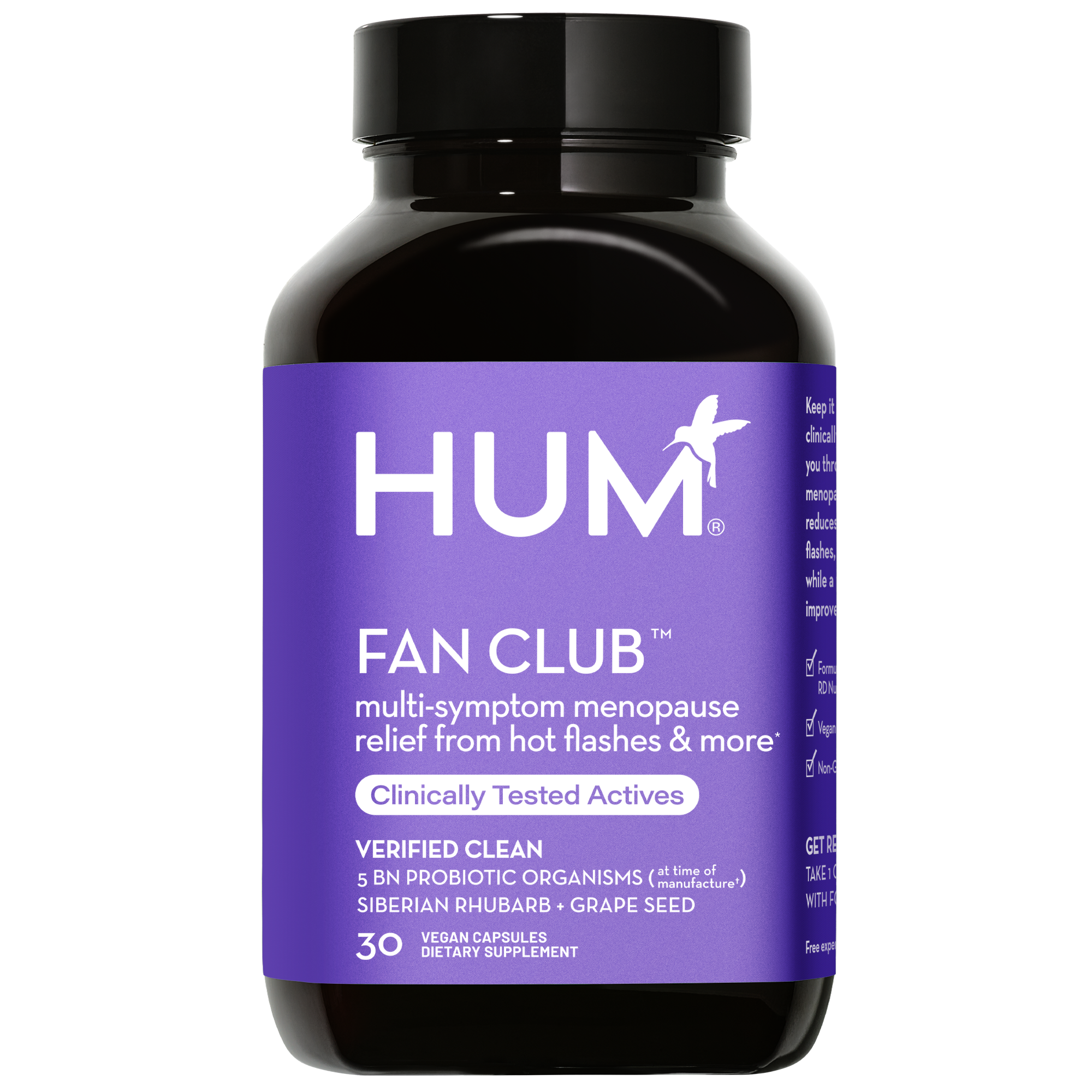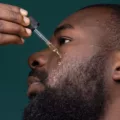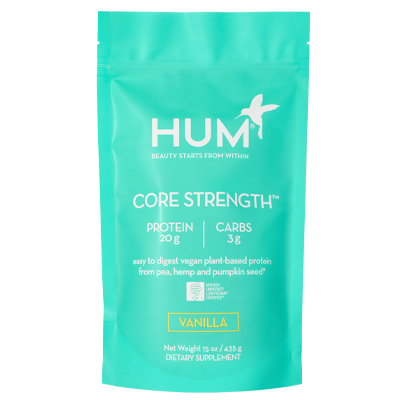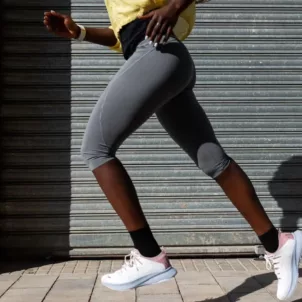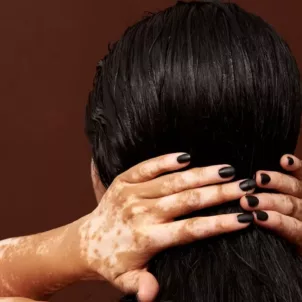Do you consider yourself a sweater? Maybe you’ve looked around a workout class at others—during the warm-up—and asked, “Why do I sweat so easily?” or found yourself drenched after a seemingly easy walk around the block. Read to find out why it happens and how you can cool down.
Ever find yourself sopping with armpit sweat through your T-shirts, or breaking a sweat instantly at yoga class no matter how “hot” it actually is? You’ve probably wondered if you simply sweat more than usual or if you have a health condition known as hyperhidrosis.
The main difference between having hyperhidrosis and sweating easily and heavily is that having hyperhidrosis causes your body to sweat for no reason, according to the Cleveland Clinic.
“Sweating is essential for our health, as it is our body’s natural process for excreting toxins and regulating body temperature,” says Michele Green, MD, a board-certified cosmetic dermatologist based in New York City. “If you’re somewhere warm, exercising, or feeling nervous or scared, your sweat glands secrete water and minerals to stabilize blood temperature.”
But if you’re no longer in the heat or exercising, your body should stop secreting sweat. For those who have hyperhidrosis, the signal to produce sweat doesn’t turn off, Dr. Green says. Below, dermatologists explain causes and contributors of hyperhidrosis and other reasons why you may sweat easily.
What Causes Excessive Sweating?
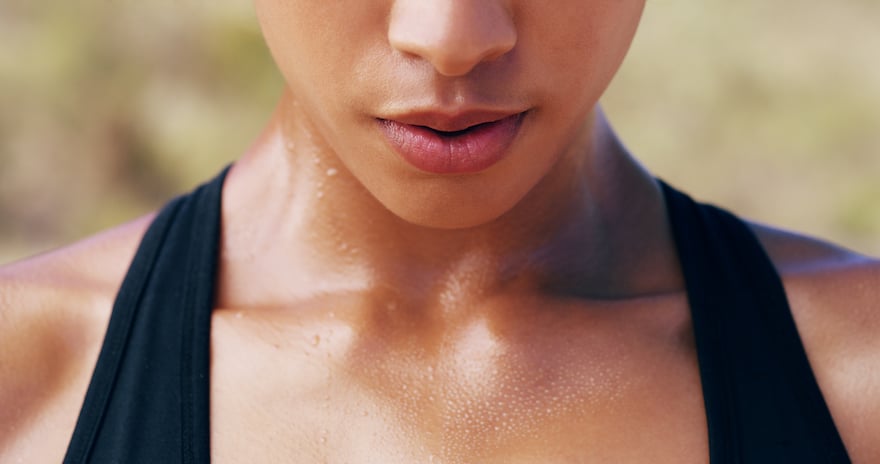
1. You Have Hyperhidrosis
“If you experience sweating in situations where sweating isn’t necessary, you may have hyperhidrosis,” Dr. Green says. If this sounds like you, talk to a board-certified dermatologist to get a proper diagnosis. And know that you’re not alone: About 15.3 million people in the U.S. have hyperhidrosis, with 70 percent reporting severe excessive sweating in at least one area of their body, according to a 2016 study in the Archives of Dermatological Research.
There are two categories of hyperhidrosis: primary (focal) and secondary (generalized).
Primary Hyperhidrosis
Primary hyperhidrosis means you have overactive sweat glands in specific areas of your body, such as your armpits, hands, feet, or face, Dr. Green explains.
“The cause of primary hyperhidrosis is not yet known, although research suggests that there may be a genetic component to this condition,” she says.
For example, a 2020 study in Biochemical and Biophysical Research Communications found that people with primary focal hyperhidrosis had overexpression of a gene called activin A receptor type 1 (ACVR1), which can promote the proliferation of sweat gland cells.
Secondary Hyperhidrosis
“When caused by a health condition, it is referred to as secondary, or generalized hyperhidrosis, meaning that you will sweat throughout your entire body rather than just focus on spots like your armpits or hands. This can also cause night sweats,” says George Bitar, MD, FACS, a board-certified cosmetic plastic surgeon based in Washington, DC.
These are a few causes that could be behind secondary hyperhidrosis:
Hormonal Changes
Whether you’re going through menopause, perimenopause, pregnancy, or your menstrual cycle, hormonal changes can impact how much you sweat—and thus lead to excessive sweating. Menopause and pregnancy, in particular, are linked to hot flashes, which can trigger excessive sweating.
Diabetes
If you have diabetes, you may experience excessive sweating when your blood sugar is low, according to the American Diabetes Association. That’s because low blood sugar causes symptoms such as increased heart rate, flushing, and hunger—all of which can signal to the brain that you’re overheating and need to cool down through sweating.
Medication
One of the potential reasons you sweat easily? Your medication. Sweating more than usual can be a common side effect of certain medications such as:
- Anxiety medication
- Birth control
- Hormone replacement medication
- Antidepressant medication
- Diabetes medication
- Certain antibiotics
- Pain medication
Anxiety
Anxiety activates the body’s fight or flight response, which raises your heart rate and body temperature, among other things, to prepare you for the real or perceived threat. The rise in body temperature can lead you to sweat easily.
Thyroid Disorders
People who experience hyperthyroidism (which occurs when your thyroid is overactive) can also experience excessive sweating, per the American Thyroid Association. That’s because an overactive thyroid can cause an increased heartbeat, which can trigger the body to think it’s overheating and needs to perspire. Sweating can also result because the condition increases metabolism and body heat production, Dr. Green says.
2. You Have a Heightened Heat Response
If you sweat easily when you’re out in the sun or working out, it doesn’t necessarily signal a health concern. Sometimes, it can be chalked up to an exaggerated response to heat. “It can happen to anyone with overworking nerves that cause sweat,” says Dr. Green. Since sweat uses heat energy to evaporate from the skin and cool your body, people may experience excessive sweating, Dr. Green says.
3. You’re Dealing With a Hangover
Ever gone to bed after having a few drinks too many, only to wake up drenched in sweat? You’re not alone. Our bodies respond to alcohol with excessive sweating for a few different reasons. First and foremost, research has shown alcohol negatively affects our nervous system, which in turn throws off our body’s ability to sense and regulate body temperature. As such, we sense that we’re hot and flushed, and we sweat in response to that feeling to cool ourselves down.
Additionally, studies have confirmed that alcohol can speed up the heart rate (and even cause heart rate irregularity). This causes blood vessels to widen (known as vasodilation), which moves warm, oxygen-rich blood closer to the surface of our skin—causing the entire body to feel warm and flushed (which can trigger excess sweat).
4. You Ate Too Much Sugar
If you’re wondering how to stop sweating so easily, cutting back on sugary foods might be the answer. Desserts and high-sugar drinks can cause your blood sugar to spike and fall rapidly, according to Stanford Health. In response to these dramatic fluctuations, your body begins to sweat.
5. You Had Some Spicy Food
Most spicy meals contain chili peppers, which contain a compound called capsaicin. It’s what can make you feel warm, flushed, and a little sweaty. Capsaicin binds to the nervous system and sends signals to the brain that are interpreted as heat. It triggers the body to try and cool off by sweating. (PSA: If you’re wondering, “Why do I sweat so much on my face?” spicy food could be the answer. When you consume a fiery meal, you’re most likely to notice your neck and head sweating.)
6. You Exercise A Lot
Here’s some good news: If you struggle with excessive sweating, it may indicate a higher level of fitness. Research suggests that the more an athlete works out—particularly doing aerobic activities, such as long-distance running—the more they tend to sweat. So if you notice that you’re sweating more in your workout classes, it could be because of your high fitness level.
The Major Downside When You Sweat Easily
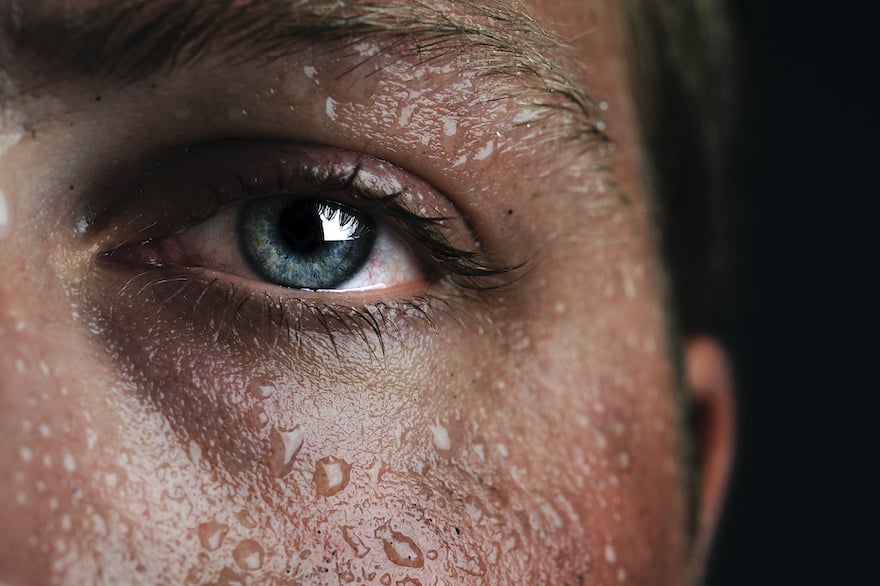
You’re already well aware of the discomfort from sweating easily, but there may be a health risk associated with it as well. Over time, excessive sweating can increase your risk of developing a skin infection.
“Sweat can break down the skin and impair the skin’s natural protective barrier, allowing bacteria and viruses to enter more easily,” Dr. Green says. “Excessive sweating can also cause tinea cruris (jock itch), a fungal infection that often occurs in the folds of the groin, where heavy sweating creates a moist environment that is favorable for the growth of fungus.”
And if you have hyperhidrosis in the foot, it can cause tinea pedis (athlete’s foot), Dr. Green adds. Much like tinea cruris, the moisture in the foot allows the fungus to proliferate.
How to Stop Sweat and Feel Confident
If you’ve been diagnosed with hyperhidrosis, talk to a board-certified dermatologist about the best treatment option for you. For those who have secondary hyperhidrosis, your doctor may offer treatments for the underlying condition, which can help ease your symptoms.
Ahead, you’ll find some of the most effective ways to treat hyperhidrosis. Those who sweat heavily or easily may also benefit from these treatments, so speak to a dermatologist to figure out the best option for you.
1. Consider Botox
You’ve probably heard of Botox (botulinum toxin) as a way to soften fine lines and wrinkles. However, it’s also an FDA-approved treatment option for hyperhidrosis.
“Botox disables sweat glands by blocking the release of acetylcholine and shuts down the action of the sweat glands present at the injection site,” Dr. Green says. “It is a popular, effective, and non-invasive treatment for excessive sweating and should be performed by an experienced, board-certified dermatologist.”
The downside is that you need to have Botox injections done consistently in order to maintain its benefits, adds Dr. Bitar, who treats people with hyperhidrosis.
“The injections are most successful when hyperhidrosis affects one area of the body, or focal hyperhidrosis. When using Botox to prevent sweating, your physician will make 10 to 15 small injections into the affected area, usually the underarms,” Dr. Bitar says.
He notes that you should start to notice less sweat in four weeks, and the treatment can last up to six months. If you find that you’re starting to sweat more excessively again, reach out to your doctor.
2. Apply Prescription Antiperspirants and Creams
These antiperspirants are much stronger than the ones available at the drugstore. Prescription antiperspirants work by building salt clogs that prevent sweat from reaching the surface, Dr. Green says.
For example, prescription antiperspirants, such as Drysol, have aluminum chloride. It’s a key ingredient that intercepts sweat glands in the eccrine system (sweat glands that cover most of your body), she says
“A smart tip is to apply antiperspirant at bedtime to dry and clean underarms. This gives the product time to create a block over the sweat duct,” Dr. Bitar says.
3. Use Anticholinergics
These are systemic medications that limit sweat production in your sweat glands. Dr. Green says. “It is often prescribed for those who experience excessive sweating in areas of the body that topical medications aren’t suitable for, such as the face and scalp.”
For example, glycopyrronium tosylate (Qbrexza) is a topical anticholinergic treatment found in pre-moistened cloths that are often prescribed to children as young as nine years old for managing hyperhidrosis, Dr. Green says.
If other treatments for hyperhidrosis don’t work for you, surgical procedures, like sweat gland removal and endoscopic thoracic sympathectomy (surgery to cut or destroy sweat-controlling nerves), are other options, Dr. Green says.
4. Avoid Spicy Foods and Caffeine
While flavorful, spicy curry or buffalo wings sound delicious, they may exacerbate your sweating issues. The same goes for your morning cup of joe (sorry to break the news). That’s because spicy food and caffeine can trigger sweating. “Because caffeine is a stimulant that works on the adrenal glands, consuming it can cause extra sweat from the feet, palms, and underarms,” Dr. Bitar explains. Try swapping it for something with a lower caffeine content, like matcha, green tea, or black tea.
5. Modify Your Wardrobe
Dr. Bitar says opting for light-colored clothing can be helpful. Light-colored clothing easily reflects the sunlight. Meanwhile, dark clothes have trouble reflecting the sun’s rays. Because of that, the dark-colored clothing traps the heat from the sun—making you feel hotter and sweatier.
Additionally, wear sweat-wicking fabrics during your workouts to keep yourself from feeling drenched in sweat.
6. Stay Hydrated
Excessive sweating can also lead to dehydration, so you also want to make sure you’re consuming enough water to replace the loss of fluid, Dr. Green says. It’s imperative to drink more water if you’re in hotter environments or exercising.
